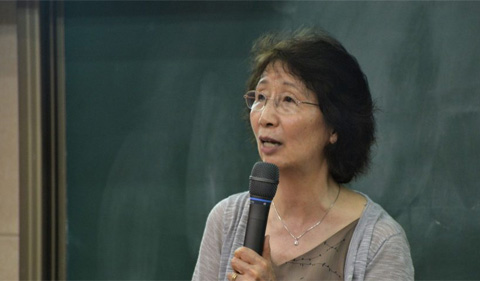Dr. Liang Tao, Associate Professor of Linguistics, recently delivered two lectures in Beijing, China—a conference presentation and a one-day lecture.
Tao’s invitation to speak at the seminar is acknowledgement of the major contribution she has made to the field of usage-based linguistic studies, and a recognition of the role that Ohio University has played by supporting her research.
In her conference presentation at the third International Conference on Interactional Linguistics and Chinese Language Studies (Aug. 23-24), Tao used one specific formulaic expression in spoken Beijing Mandarin to illustrate how human communication is built one sound at a time while maintaining a mental representation of the intended utterance. In other words, speakers “act locally but think globally.” Her talk brought attention to how and why an utterance is produced locally, which will offer more insight into how an utterance is chosen to build coherent conversation.
The Seminar on Interactional Linguistics 2018 (Aug. 25-30) was a workshop, the first of its kind to be offered in China. It introduced theoretical issues, current findings, and practical means to promote and help scholars and advanced Ph.D. students to conduct linguistic research in interactional linguistics, the multimodal nature of human communication, and human cognition.
In her one-day lecture, Tao spoke about grammar in conversational speech. Using theoretical proposals from Paul Hopper, Barbara Fox, Joan Bybee, and others, she introduced the theoretical notion of emergent grammar from two areas: where grammar comes from and current grammatical changes through usage. The first area emphasizes the current theoretical belief that the structure or form of grammar comes from repetitive usage of small, formulaic utterances. The second area used conversational data from Beijing Mandarin to focus on instances of new grammatical patterns emerging out of everyday language use. In the talk, Tao also reviewed experimental studies supporting the proposal that human interaction through everyday language use not only shapes grammar, but also constantly changes grammar, which in turn, impacts human cognitive processes in communication.
The Seminar on Interactional Linguistics 2018 included leading researchers in the area of interactional linguistics from both China and other countries: John Heritage (Distinguished Professor of Sociology of UCLA), Hongyin Tao (Chief Editor of the journal Chinese Language and Discourse and Linguistics Professor of UCLA), Margaret Selting (leading researcher and proposer of Interactional Linguistics, Professor at the Universität Potsdam), Xiaoting Li of the University of Alberta, Canada, and two leading Chinese linguists (Jiaxuan Shen, Fellow of the Chinese Academy of Social Sciences and Mei Fang, secretary of the Linguistic Society of China).




















Comments